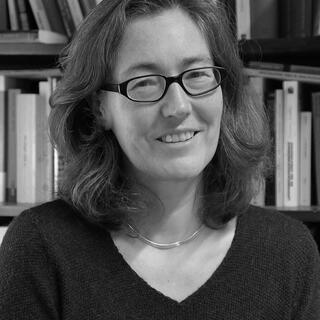Prof. Dr. Bettina Henzler
Professors

Prof. Dr. Bettina Henzler
Film scholar, habilitated in film studies and aesthetic education. Author of »Filmästhetik und Vermittlung« and »Filmische Kindheitsfiguren«.
Vita
Dr. habil. Bettina Henzler studied Comparative Literature, English and German Studies at the Rheinische Friedrich-Wilhelms-Universität Bonn and the Université libre de Bruxelles. She then worked as a freelancer in the field of festivals, film culture and mediation before becoming a research assistant at the Institute for Art Studies – Film Studies – Art Education at the University of Bremen in 2006, where she subsequently supervised various third-party funded projects in teaching development and research. In her dissertation, published in 2013 under the title »Filmästhetik und Vermittlung«, she focussed on the history, theory and practice of Alain Bergala’s aesthetic approach to film education and mediation. Her habilitation (published under the title »Filmische Kindheitsfiguren«, 2022) focused on film aesthetic figurations of childhood in French cinema.
In cooperation with Universität Bremen (ZeMKI) and Université Sorbonne Nouvelle Paris (IRCAV), she is currently researching and evaluating film-aesthetic education processes as part of the Erasmus+-funded international film education project »Exploring cinéma, cent ans de jeunesse«.
Bettina Henzler has taught at the University of Bremen and the Film University Konrad Wolf and was guest professor at the Free University of Berlin. She also works as a trainer, author and reviewer in (school) film education – cooperating with film cultural institutions such as Deutsche Kinemathek Berlin or Deutsches Filminstitut & Filmmuseum Frankfurt am Main. She co-edited several publications on film education und childhood studies (including »Filme sehen, Kino verstehen«, 2009; »Learning from the cinema«, 2010; »Childhood, cinema, and film aesthetics«, 2017).
Research Affiliations:
ZemKI – Zentrum für Medien, Kommunikations- und Informationsforschung, Universität Bremen
IRCAV –Institut de Recherche Cinéma et Audiovisuel, Université Sorbonne Nouvelle (Paris 3)
Publications
Monographs
Filmische Kindheitsfiguren. Bewegung – Fremdheit – Spiel. Berlin: Vorwerk 8 2022.
Filmästhetik und Vermittlung. Zum Ansatz von Alain Bergala: Kontexte, Theorie und Praxis (Bremer Schriften zur Filmvermittlung). Marburg: Schüren 2013.
Editorships
Kino und Kindheit. Figur – Perspektive – Regie. Berlin: Bertz+Fischer 2017 (hg. zus. m. Winfried Pauleit).
Childhood, Cinema & Film Aesthetics. Berlin: Bertz+Fischer 2018 (hg. zus. m. Winfried Pauleit).
Filmvermittlung. Nachdemfilm, Nr. 13, 2013, www.nachdemfilm.de/content/no-13-filmvermittlung (hg. zus. m. Manuel Zahn und Winfried Pauleit).
Vom Kino lernen. Internationale Perspektiven der Filmvermittlung, Berlin: Bertz+Fischer 2010, (hg. zus. m. Winfried Pauleit, Christine Rüffert, Karl-Heinz Schmid, Alfred Tews).
Learning from the cinema. International Perspectives on Film Education, E-book, Berlin: Bertz+Fischer 2010 (hg. zus. m. Winfried Pauleit, Christine Rüffert,
Karl-Heinz Schmid, Alfred Tews).
Filme sehen, Kino verstehen. Methoden der Filmvermittlung (Bremer Schriften zur Filmvermittlung). Marburg: Schüren 2008 (hg. zus. m. Winfried Pauleit).
Alain Bergala: Kino als Kunst. Filmvermittlung an der Schule und anderswo (Bremer Schriften zur Filmvermittlung). Marburg: Schüren 2006 (hg. zus. m. Winfried Pauleit).
Other Publications
Complete list of publications: ORCID